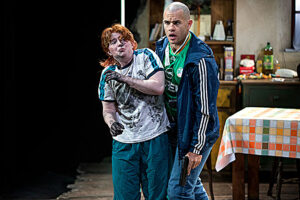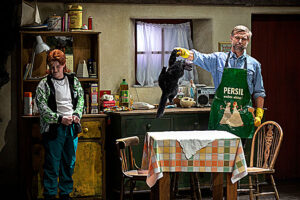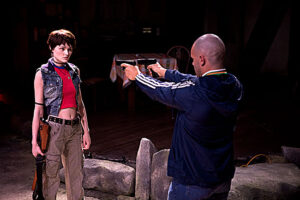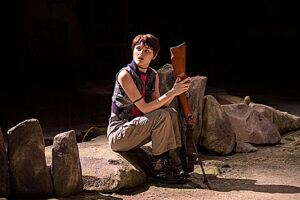
Julian Moore- Cook told David Hennessy about bringing Martin McDonagh’s The Lieutenant of Inishmore to Liverpool having years ago been part of a big West End production of the play starring Aidan Turner.
Julian Moore- Cook is starring in The Everyman theatre in Liverpool’s new current production of Martin McDonagh’s The Lieutenant of Inishmore.
Set in the Ireland of 1993, the play tells the story of Padraic, the ‘mad’ leader of the INLA.
Considered too mad for the IRA, Padraic pulls out the toe nails of drug dealers for the newer splinter group that was established by IRA men who opposed the idea of a ceasefire.
However, when Padraic finds out that Wee Thomas, his cat, isn’t well, he returns home to Inishmore. It is then that he finds out Thomas has been killed and he goes looking for revenge.
The play was first staged by the Royal Shakespeare Company in 2001 before transferring to the West End.
It would be performed for the first time on Broadway in 2006 with a cast that included a young Domhnall Gleeson and David Wilmot. That production would be nominated for four Tony Awards.
It returned to the West End in 2018 with a cast that included Aidan Turner, Chris Walley and Julian himself.
Julian played Joey in that production, now he is in the lead role of Padraic.
In 2014, The Lieutenant of Inishmore was ranked by the Daily Telegraph as one of the 15 greatest plays ever written.
Martin McDonagh came to prominence as the triple Olivier Award-winning playwright of pieces such as The Cripple of Inishmaan and The Beauty Queen of Leenane.
However, since then he has gone on to be the lauded writer/ director of films such as In Bruges, Seven Psychopaths, Three Billboards Outside Ebbing, Missouri and The Banshees of Inisherin.
The Lieutenant of Inishmore is from his Aran Islands trilogy that started with The Cripple of Inishmaan.
The new production also stars Katherine Devlin playing love interest Mairead.
Directed by Chris Sonnex, the all- Irish cast also includes Taylor McClaine, Michael Tient, Alan Turkington, Jason Kelly and Cameron McKendrick.
The Irish World chatted to Taylor, Alan, Michael and Katherine in a recent issue.
Last week we chatted to Julian, the London- based Lurgan actor told us about returning to The Lieutenant of Inishmore.
This is not your first time to appear in this play..
“No, I was in the 2018 production.
“In that production Aidan Turner played Padraic very, very well.
“I love the play.
“I read Martin McDonagh’s plays back in high school actually, GCSE and I loved his plays then.
“Lieutenant is always one of those plays that makes me laugh out loud which is very rare.
“When I read it for the 2018 production, the same thing. I was laughing on the tube at the jokes and stuff like that.
“And then six years later, I picked up the book for this one and I’m reading it again, and it’s made me laugh out loud.
“It’s a very, very funny play.”

McDonagh is known for his very Irish brand of dark humour, isn’t he?
“Yeah, I think the dark humour goes down really, really well with the Irish.
“We’ve got a macabre sense of humour and you can really tell as well in Liverpool, because there’s a big Irish community here, that humour translates as well.
“I think we’re getting a lot of laughs and it’s interesting thinking about the jokes that land with a more Irish crowd and the ones that don’t land so much with an English crowd.
“It’s a sign of good writing really.
“It’s such a brilliant play to do as an actor.
“It’s such a fun play to do, especially the second act, because people are roaring with laughter and eventually people are actually, not screaming but they’re like (gasping and grabbing their hair), they’re becoming so shocked at what’s happening on stage.
“It’s just so fun because you get that feedback.
“It’s not like doing some plays you do and you don’t hear the audience, they’re just watching silently but this one, they’re there and the audience feeds off each other, and us, the actors as well, we can’t help but feed off them when they’re really reacting.
“You’re going tonight, you’ll see yourself.
“I’m trying to get all my family to come over because it’s really worth the journey.”

Let’s talk about Padraic. He’s ‘too mad’ for the IRA and so finds himself leading the INLA..
“Exactly, he didn’t get to go mainstream with his madness.
“He’s a brilliant character.
“As actors, we crave those kind of characters where you can really throw yourself into it, and there’s so much detail there in Padraic.
“There’s so much history you can look at as well and kind of base your your character on.
“But reading the script and the things that he says, you really get a feel for this man who is probably sociopathic.
“There’s something probably a little bit wrong that we could look at modern versions of people and go, ‘Oh, he probably has a bit of that to him’.
“And then to contrast that with being a person who’s so in love with his wee cat, his wee Thomas.
“He has this kind of childlike innocence around a cat but he’s also torturing people and murdering people.
“To then have this childlike innocence is just so fun to play as an actor because you have these two wide extremes in one person.
“I think that’s where a lot of the comedy comes in, that paradox.”

Some of the greatest characters have those contradictions, don’t they? I’m thinking of Stephen Graham’s Al Capone in Boardwalk Empire who will beat a man to death one minute and then put his child to bed in the next with the blood still on his knuckles. That’s the brilliance of parts like that, isn’t it?
“It really is, and it gives you such a rush.
“We did it on Saturday. It was the first time and I came off, and I was just completely full of adrenaline, because you’re going through so many mad switches, you’re trying to remember so many things. It’s a very technical play as well.
“I don’t think we’ve given away a lot if I’m saying there’s guns and there’s stunts in the play, and there’s knives and there’s all sorts.
“So you’re managing all that and then, again, like I say, the audience, you can’t help but feel this kind of buzz that’s there.
“I’m coming home and I’m not going to sleep until about two o’clock because I’m still tapping my feet and wired up.”
Screenwriting tutors will often tell you if you have a character who is dark or unsympathetic to give them a dog or a cat, give them something to love and therefore humanise them. McDonagh seems to have taken that principle to the extreme with this character..
“Yeah, it’s interesting.
“It’s that ‘save the cat’ idea with characters.
“Padraic’s an interesting character because, without giving too much away about the play, there is a part of people that can empathise with him even though you shouldn’t.
“That’s a testament to Martin’s writing as well.
“These political ideas or the idea of violence to achieve a political end is very attractive and is very alluring.
“There’s songs about it and there’s legends about it.
“It’s then looking at, what does that actually look like in life?
“And the absurdity of wanting to kill people, but also loving your wee cat and being able to kill for your cat as well.
“It’s just totally mad.
“I think that the brilliance of Martin as well.
“That’s a really hard thing to believe but somehow he’s able to capture the balance perfectly well that it’s absurd and mad but totally rooted in truth. You do believe it.”
I think McDonagh’s writing is always rooted in real life and truth, exaggerated for comedy. Okay, we may not know anyone as extreme as Padraic but we can definitely recognise something in the characters…
“Totally, I think that word you use is very pertinent.
“People ‘recognise’ these people and they recognise this idea, these ways of thinking.
“When the play first came out, it was published into 24 languages and there was productions all over the world of it.
“So they’re very true to Irish people. We recognise these people on a very close level but there’s something about the way they behave and the ideas that they have that is actually the genius to his writing, and that’s really recognisable worldwide.
“It’s a really fantastic play.
“And Chris, our director, has done a fantastic job with the text.
“He’s really pinged out all the madness of it and the gags and the tragedy and the pathos in it as well.
“I’m very impressed by him and the whole team we’ve had, it’s been a dream.”

Central to the story is probably Padraic’s relationship with Mairead, does that show his softer side also?
“There’s something about the relationship between them too.
“It’s the idea of love and what those feelings are.
“When you meet Padraic, he’s someone who’s dedicated to his cause, and he’s sworn off women, he’s only focused on the freedom of Ulster.
“Then he meets this person who has a touch of madness themselves that maybe he recognises or relates to, and suddenly this feeling develops that is out of both their control.
“It’s one of my favourite scenes acting with Katherine as well.
“She’s a fantastic actor and she’s so generous and so easy to act off of.
“You just have to watch her and you start to feel something. And then in that feeling, you’re able to respond to her.
“There’s one scene where it’s just the two of us and it’s a real tone shift as well.”

Does it help having a completely Irish cast for this? Does that mean there’s a degree of shorthand?
“Yes, shorthand is what has been talked about.
“We’re from all over as well.
“I think that understanding of humour, some things don’t need to be explained or understood why something is funny.
“I think actors work best when they’re coming from their instincts and it’s not this big stretch that they have to make.
“And everyone in the cast is very, very well cast and unbelievably strong performances.
“Chris would say this as well, what makes the play is having that authenticity and then actors who can bring to life these brilliant characters, and they all do.”
I often ask actors if they think about previous productions of a play or actors who have played their role in the past and it’s often irrelevant, but it is different in your case in that you’ve actually been part of a big West End production of this? Did you think of how Aidan Turner played it or start finding it yourself?
“It’s an interesting thing.
“Obviously Chris, when he cast me, knew I had done it before.
“The last thing any artist wants to do is copy another artist.
“You know that that’s going to lead you down a road to ruin anyway because I’m not going to be able to do Aidan Turner as well as Aidan Turner does.
“It was also intimidating because I saw him do that part amazingly.
“That was 6 years ago and It was a real joy to watch such an experienced actor take on such a really difficult and complex role.
“It felt like very big boots to fill and I was a bit intimidated by that.
“He kind of defined the production. People call it ‘the Aidan Turner’ production, so that was scary.
“Being in the room, I had to put that production out of my head because we’re trying to do a new show and a new set of circumstances and themes and a director’s vision.
“So it was the practice of not thinking about that too much because you could take something from that and try and put it into this, and it just really wouldn’t work.
“A lot of what I tried to do is one, be myself and what I thought of the character. And two, listen to Chris and trust Chris as a director.
“I felt very early on that he had a good vision for the play.
“He wanted to look at the youth of the characters.
“When you read this play, it says their ages in it and they’re very young.
“Chris said, ‘I haven’t seen a production that highlighted the youth of them’.
“When he said that I thought, ‘That’s a brilliant idea’.
“Because I think there’s something about the extremism of violence that actually preys on young people and that passion that young people have to want a better world, and then people kind of take that passion and mould it into something that could actually be harmful.”
Just one more mention of 2018 and seeing Aidan Turner play Padraic were you, at that time, thinking, ‘I would love to one day play it’?
“Yeah, of course.
“It’s an amazing part.
“It’s just like an actor’s dream.
“I was very proud to be in that production and to watch someone do it so well, and to learn from him as well, see how he navigated a very, very difficult part and was able to pull it off in such a stunning fashion.
“When this audition came through, I just wanted it so bad.
“I find as an actor, I work better with a challenge.”
Does the Lieutenant in the title refer to Padraic? Is he the Lieutenant of Inishmore because I have heard it may be Mairead?
“I guess it’s open to interpretation because it’s never said.
“I love a play you can discuss because some people can be like, ‘No, he’s the lieutenant because of this’, and other people are like, ‘She’s obviously the Lieutenant because of this’.
“It’s funny you say Lieutenant as well because I remember when we did the first production someone said ‘leftenant’.
“It was like, ‘We’re not English, it’s Lieutenant. He’s not a ‘leftenant’ at all, I refuse to have that.”
The Lieutenant of Inishmore runs until 12 October.
For tickets and more information, click here.



